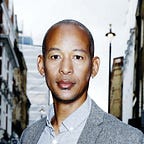WRITING|CREATIVE WRITING
Why Writers Have More In Common with Chairman Mao Than You Might Think
Understanding the chaotic nature of writing
If, like me, you buy or you are subscribed to the New Humanist, you, too, probably read an essay by Philip Pullman that appeared on the pages of the magazine almost ten years ago. Under the title “Writing is despotism, but reading is democracy”, the best-selling author mixed cuckoos, philosophy, censorship, and writers’ responsibility towards their readers.
The title of Pullman’s piece is, of course, confrontational. Because that is what the better intellectual minds do; they provoke, and in the process they make us think. Pullman’s statement might come across as absolutist and dogmatic, but scrape the surface and you will find plenty to agree with. Equally, some of his ideas will leave you shaking your head.
I think Pullman is right when he says that “arts have other values (…) that can’t be measured in financial terms.” In this case his use of Wilde’s theory of books not being either moral or immoral, only good or bad, is apposite.
Similarly, the kernel of his argument, the writer’s despotism vs reader’s democracy is hard to disagree with prima facie. On writing a book (regardless of the genre), the writer…
